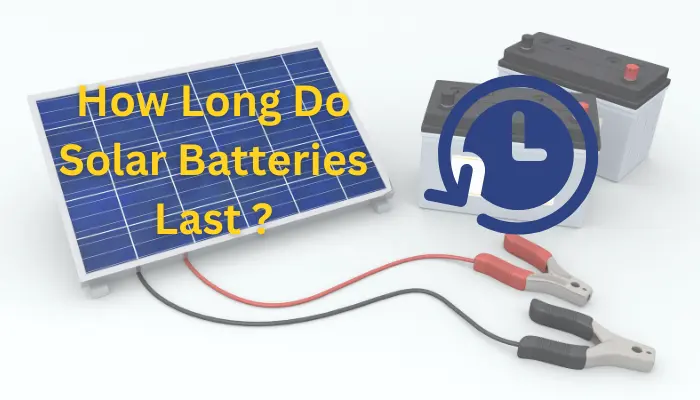How Long Do Solar Batteries Last? Understanding The Lifespan
Solar storage is beneficial for solar panel owners. It can keep devices running during power outages and lower electricity bills by avoiding high demand charges. Solar batteries provide free energy from your solar panels exactly when you need it most.
However, buying a solar storage system requires an upfront investment. Before installing solar batteries, you should know their lifespan and replacement frequency.
In this blog, we’ll explore the lifespan of a solar battery and the factors that affect its longevity.
How Long Do Solar Batteries Last?

Most solar batteries available on the market today have a lifespan of five to 15 years. However, solar garden lights that use nickel-based rechargeable batteries typically last only 2 to 3 years.
If properly maintained, some batteries can reach a maximum lifespan of 15 years. The lifespan also depends on factors such as temperature, battery type, and charge-discharge duration, which we will discuss later.
If you have a solar PV system, the solar cells can last for 25 to 30 years. You’ll likely need to replace them at least once during your solar panel system’s 25 to 30+ year lifespan.
Factors That Affect the Lifespan of Your Battery
You might wonder why the lifespan of solar batteries varies so much. Several factors influence this, including the type of battery you choose, how often you use it, and where you store it. These factors significantly impact how long your battery will last.
How Often You Use the Batteries
You might have noticed that your laptop or smartphone battery lasts less time between charges after a couple of years. A fully charged battery that once lasted 12 hours might now only last three.
This decline is frustrating but inevitable with all batteries. A battery’s lifespan diminishes with increased frequency of charging and discharging. After a while, the battery won’t be able to hold and release energy well.
This is why battery life spans can vary widely. The dependence is not based on installed years but on how often each solar owner uses them. Using battery power every night in an off-grid system will shorten the lifespan of the batteries. In contrast, batteries in a grid-tied solar system will last longer if you only use them during power outages.
To make your batteries last longer, follow the manufacturer’s advice on how deeply you should discharge them. DoD refers to the proportion of the battery’s stored power that you utilize. If your battery holds 13.5 kWh and you use 10 kWh, the depth of discharge is 74%.
Maintaining the recommended DoD is crucial because exceeding it can significantly reduce your battery’s lifespan. – Each type of battery has a recommended maximum depth of discharge (DoD). – It is important to follow this recommendation to extend the lifespan of your batteries.
Type of Solar Battery Systems You Install
The three main types of solar batteries commonly used in solar storage are lead-acid, lithium-ion, and saltwater. Lithium-ion batteries last the longest and offer the best storage capacity, though they may not be the cheapest option.
Lithium-ion batteries last longer, saving money on replacements in the long run and making them a good investment. They can discharge up to 80%, so you can use more energy without harming the battery.
Lead-acid batteries are another popular choice. Their comparatively affordable price and high energy storage capacity have been fundamental to off-grid solar systems for many years. However, they have a shorter lifespan and fewer cycles than other options.
Lead-acid batteries typically have a DoD of 30-50%, which allows users to use only a portion of the stored energy. Although cheaper initially, they may require more frequent replacements, leading to higher long-term costs.
Batteries that use saltwater are a recent innovation. They employ salt for storing and discharging energy, making them safe and easy to recycle. Although they typically outlast lead-acid batteries, they usually don’t have the same lifespan as lithium-ion batteries. Nevertheless, they boast high Depth of Discharge (DoD) rates comparable to lithium-ion batteries.
When choosing a solar battery installation, also consider the manufacturer’s warranty. Some manufacturers provide battery warranties based on the number of uses or a specific period to ensure that you do not receive a defective product.
Store the batteries in the environment.
Batteries perform best in moderate temperatures. Storing items in a garage, basement, or temperature-controlled area can help them last longer lifespan. Leaving items outside in bad weather can cause them to deteriorate more quickly.
Protecting items from harsh weather conditions is important to preserve their quality. To extend solar battery life, consider storing items in a suitable indoor location.
In warm temperatures, batteries experience quicker chemical reactions, which can shorten their lifespan because of increased wear and tear. In extremely cold temperatures, the battery drains faster and becomes less efficient because the chemical reactions slow down.
Lead-acid batteries are susceptible to temperature changes. They are best kept between 40°F and 80°F. Lithium-ion solar batteries can handle temperatures below 0°F to 140°F but work best in moderate temperatures.
Saltwater batteries work best in temperatures between 23°F and 104°F. They are more durable than lead-acid batteries but less rugged than lithium-ion batteries.
Battery Lifespan Summed Up
Solar batteries usually last between 5 and 15 years. During the 25-30 year lifespan of your solar system, you may need to replace them once.
To make your battery last longer:
- Use it correctly.
- Buy quality products with good warranties.
- Store it in a climate-controlled place.
Even though battery prices have decreased in recent years, they still represent a significant investment. At Solar Earth Inc., we want to help you make the right choice and get a solar storage system that meets your needs. If you are interested in a battery backup power system, don’t hesitate to contact us by clicking the button provided below.
